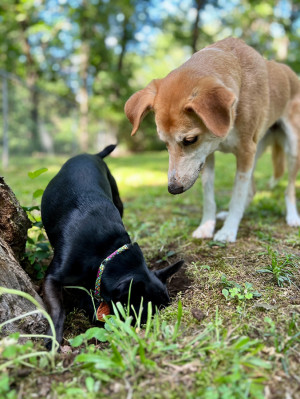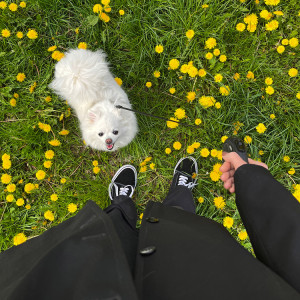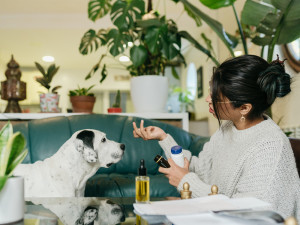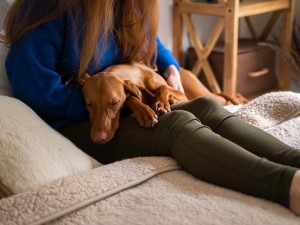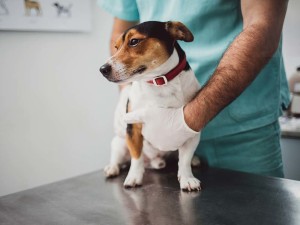Giardia In Dogs: Signs, Symptoms and Treatment of This Summer Parasite
If your dog drinks from puddles or splashes around in streams, read this
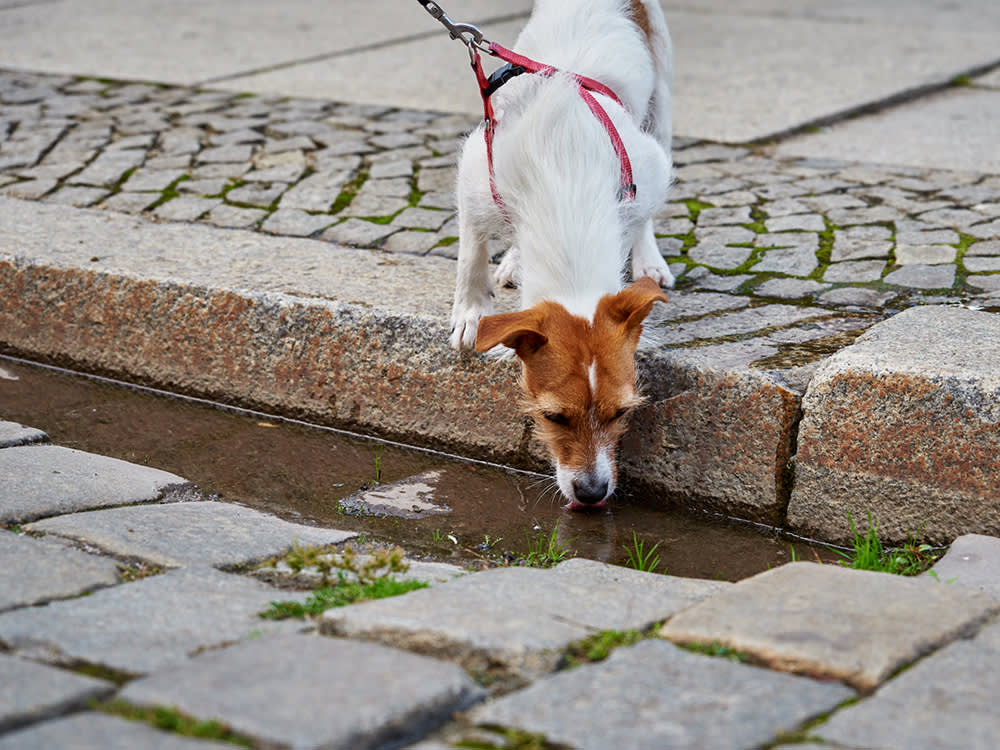
share article
As a vet, I see lots of diarrhoea – and when I say “lots” I mean lots. One of the common causes of diarrhoea in dogsopens in a new tab worldwide is Giardia, a parasite that dogs get from drinking from puddles, lakes, streams or other sources of stagnant water. While it’s a year-round risk, Giardia cases peak in the summer because people and pets spend more time outdoors and travelling. Here’s everything you need to know about Giardia in dogs, including how to spot it, treat it and prevent it from happening in the first place.
What is Giardia?
Giardia is a ubiquitous single-celled protozoan parasite that can live in the intestines of dogs. The parasite thrives in cool, moist environments and can survive for months in the right conditions. Giardia can infect dogs, cats, wild animals and people too.
How do dogs get Giardia?
Giardiasis is transmitted by a faecal-oral route, meaning that the parasite is swallowed in food and water contaminated with faeces. Your pet does not have to eat poo to get the parasite. In fact, dogs most commonly get Giardia by drinking from contaminated water sources (think: puddles, gutters, lakes and streams).
What are the symptoms of Giardia in dogs?
Giardia symptoms in dogs can include diarrhoea, gas, abdominal discomfort, nausea and vomiting. That said, an infection can be present without symptoms. Not all dogs show symptoms of a Giardia infection but when they do the most common symptom is watery diarrhoea. Additional Giardia symptoms in dogs may include:
severe diarrhoeaopens in a new tab (often with blood and mucus)
weight loss
decreased appetite
gas
dehydration
dry or poor coat appearance
If your dog has diarrhoea that persists beyond 24 hours or is very sudden and severe, take them to the vet asap.
How is Giardia in dogs diagnosed?
Diagnosis is often made by evaluating faecal material under a microscope. However, the little parasite Giardia can be difficult to find. So, in addition, we use a ‘snap test’, adding some stool to a solution that gives us a positive or negative result for Giardia (like a pregnancy test for poo). This test is very sensitive to the presence of Giardia in dogs.
What is the treatment for Giardia in dogs?
To treat Giardia in dogs, veterinarians will typically prescribe a combination of giardiasis medication such as fenbendazole (dewormer) and metronidazole (antibiotic) for about 10 days. In small puppies or dogs sensitive to this antibiotic, a dewormer known as Panacur can be used instead for 5–10 days. Your pet’s poo should be retested two to four weeks after finishing the medication.
You may have heard about a Giardia vaccine. Researchopens in a new tab shows it can prevent Giardia infections in both dogs and humans. However, it is not licensed in the UK.
How long does it take for a dog to recover from Giardia?
Most healthy dogs recover from Giardia within a few weeks. In some cases, supportive treatment, including IV fluids and hospitalisation, may be required if dehydration or severe diarrhoea persists. Puppies, senior dogsopens in a new tab and those with compromised immune systems are at higher risk for complications, including death. Your veterinarian will determine the best course of treatment.
How can Giardia in dogs be prevented?
The best way to prevent a Giardia infection is to keep your dog from drinking out of puddles, lakes, streams or other sources of stagnant water (easier said than done, but effort is everything). Remember, Giardia is transmitted orally and what better place to have concentrated levels of poo than a park, especially when some pet parents are not diligent about removing their dog’s poo.
It may also be advisable to treat other animals in the same household while treating the infected, symptomatic pet.
There are also environmental control measures that can be taken to prevent reinfection. Be vigilant about clearing faecal material from the environment. If your dog has been diagnosed with Giardia, it is often recommended that you wash as many areas of your environment as possible, followed by disinfection with a solution of bleach diluted in water (another measure that’s easier said than done).
Pick up your dog’s poo frequently.
If you have cats (indoors or outdoors), pick up their poo, too.
Clean your dog’s bowls regularly with soap and water.
Wash your dog’s toys and bedding often.
Disinfect areas such as crates and kennels.
Avoid walking your dog in moist areas where other dogs or wildlife may have pooed.
Frequently asked questions
Can Giardia infections recur?
Yes, dogs can easily reinfect themselves with Giardia. That’s why it’s important to thoroughly clean all the areas your dog may have touched.
Is Giardia more common in puppies?
Because their immune systems aren't as developed as older dogs, puppies are more likely to contract Giardia.
Is there a vaccine available to prevent Giardia in puppies?
Yes, but it is not available in the UK and is usually reserved for high-risk dogs in other countries.
Can I get Giardia from my dog?
It’s possible but unlikelyopens in a new tab. There are several kinds of Giardia and dogs are most commonly infected with a variant that doesn’t infect humans.
References
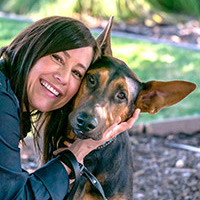
Dr. Shea Cox, DVM, CVPP, CHPV
Dr. Shea Cox is the founder of BluePearl Pet Hospice and is a global leader in animal hospice and palliative care. With a focus on technology, innovation and education, her efforts are changing the end-of-life landscape in veterinary medicine.
Related articles
![Woman taking care of her sick dog at home.]() opens in a new tab
opens in a new tabCan Dogs Take Aspirin? A Guide to Dog Pain Medication
There are safer alternatives and you should always, always check with a vet before giving your pup anything
![Two dogs digging outside in the dirt.]() opens in a new tab
opens in a new tabTypes of Worms In Dogs: How to Detect and Treat Worms In Dogs
Here are the types of worms your pup could get, how you know they have them in the first place and how to get rid of them for good
![Red-haired woman holding sleeping dog in her lap on the bed]() opens in a new tab
opens in a new tab6 Reasons Your Dog Is Vomiting
And how to help them feel better fast
![dog near pee spot on carpet]() opens in a new tab
opens in a new tabHow to Remove Dog Wee and Other Stains from Carpet – Without Harsh Chemicals
The next time your dog wees on your favourite rug, be prepared with this simple, three-step cleaning method
![Veterinarian examining a dog]() opens in a new tab
opens in a new tabHGE in Dogs: Causes, Symptoms and Treatment
Certain symptoms could mean your dog is battling a potentially fatal condition called haemorrhagic gastroenteritis (HGE). Here’s everything you need to know
